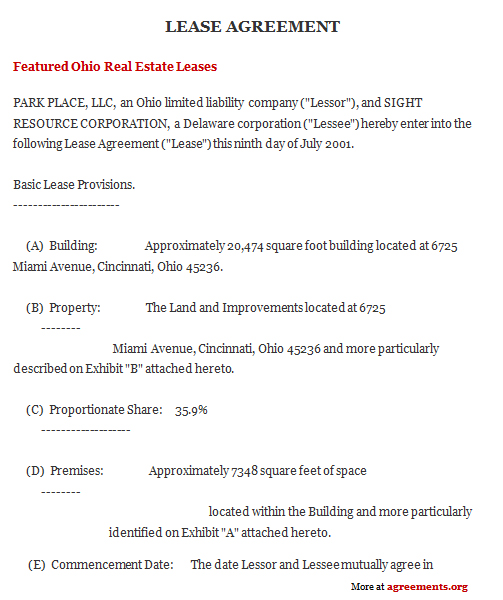Whenever a landlord is leasing his property that is situated in the state of Ohio, it is advisable to have an Ohio lease agreement with the tenant. This ensures that the interests of both parties are protected, and they are aware of their respective obligations. For instance, a tenant cannot use the property for illegal purposes while a landlord cannot evict a tenant without a justification.
A properly written agreement removes any doubts that a party may have regarding the terms of the lease. If there is a dispute, the parties can refer to the agreement and resolve the same. It also serves as the primary reference to the courts to affix liability while also ensuring that the laws of Ohio are followed.
Key terms of the Ohio Lease Agreement
Some of the key terms to be included in an Ohio lease agreement are:
- Names of the parties
- Date of entering into the agreement
- Description of the property
- Term of the lease
- Amount of rent and mode of payment
- Number of occupants and their names
- Details of the security deposit
- Use of premises
- Repair and maintenance
- Responsibilities of the tenant
- Responsibilities of the landlord
- Subletting not permitted
- Landlord’s right of entry
- Pet policy
- Disclosures mandated by law
- Grounds for termination
- Default by either party
- Remedies for default
- Governing law of the agreement to be the law of the state of Ohio
- Signatures of both the parties
How to Draft the Ohio Lease Agreement?
When drafting an Ohio lease agreement, it is important to ensure that the provisions do not contravene any law of Ohio. The steps mentioned below may be followed:
- Both parties should meet to negotiate the conditions of the lease.
- Decide the duration of the lease- it may be for a few months or a year. Clearly mention the date when the lease will begin and when it will come to an end.
- Specify the nature of the lease and the use of the property. If it is a residential lease, the property shall only be used for residential purposes. Conversely, a commercial lease shall only be used for commercial use.
- Both parties should agree to the rent payable for the lease. In addition to the amount, the date when it is due and the mode of payment should also be finalized.
- Inform the tenant about the details of the security deposit. This clause should comply with the laws of Ohio. It should specify the amount of security deposit to be collected as well as the conditions and mode of its return.
- Discuss the rights and obligations of each party and set out the agreed terms clearly in the contract.
- The landlord should disclose all the information that is mandated by the law of the state of Ohio.
- Incorporate an explicit clause to restrict illegal activities on the premises in order to protect the landlord from potential lawsuits.
- State the grounds for termination of the lease agreement and the procedure for eviction.
- Clearly state the requirement of a notice on the part of both parties. The landlord should give at least twenty-four hours’ notice before entering the premises. The tenant, on the other hand, should give notice before terminating the agreement prematurely.
- Ensure that both parties sign the agreement.
Types of Ohio Lease Agreement
The following are the types of lease agreements in Ohio:
- Commercial lease agreement: An agreement to use the property for business such as a restaurant or office.
- The standard residential lease agreement
- Month to month lease agreement: Month to a monthly lease agreement that continues every month and may be terminated by giving at least thirty days’ notice.
- Lease with an option to purchase: Gives the tenant an option to purchase the property.
- Roommate agreement: Roommate agreement between individuals who share the property where each person occupies a bedroom and shares the common areas. It lists the responsibilities of each member.
What Happens In Case of Violation?
There are certain situations under Ohio law when breaking a lease is justified. These include instances where the tenant is starting active military duty, the property violates the health and safety codes of Ohio, or the landlord harasses the tenant. However, if the lease is terminated unlawfully, the landlord can sue the tenant for the rent owed and initiate eviction proceedings against him.
Download Sample Ohio Lease Agreement
A sample Ohio lease agreement can be downloaded below.
Ohio Lease Agreement
